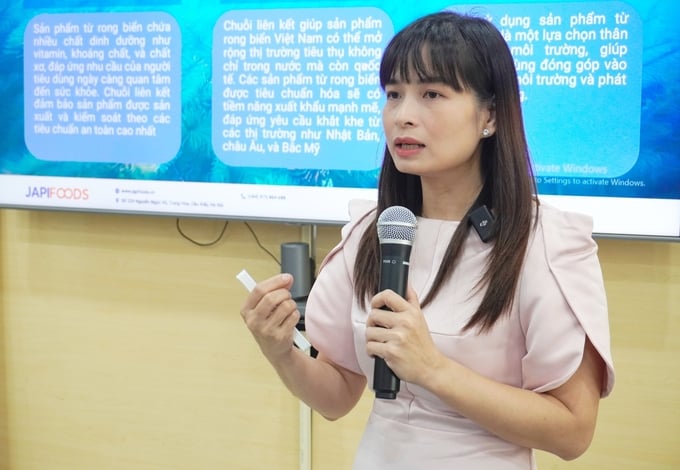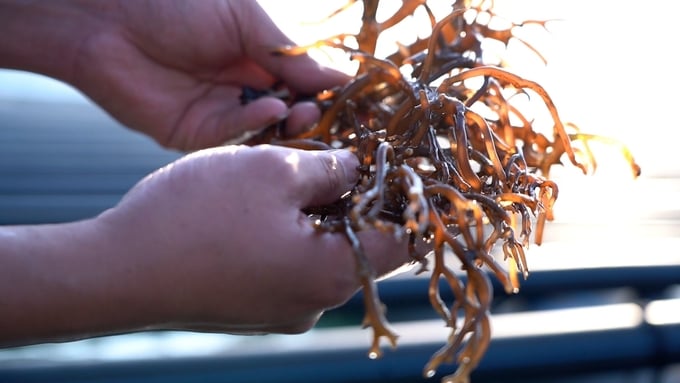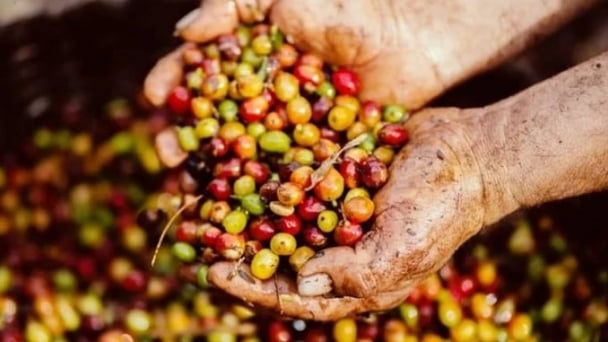June 17, 2025 | 21:52 GMT +7
June 17, 2025 | 21:52 GMT +7
Hotline: 0913.378.918
June 17, 2025 | 21:52 GMT +7
Hotline: 0913.378.918
Mr. Dinh Xuan Lap, Deputy Director of the International Collaborating Centre for Aquaculture and Fisheries Sustainability (ICAFIS), Vietnam Fisheries Association, raised the question of why linking the chain is necessary for developing seaweed.
According to statistics from the Department of Fisheries (MARD), the total seaweed cultivation area in Vietnam reached only 16,500 hectares in 2023, with a production volume of about 150,000 tons.

Mr. Lap emphasized that although Vietnam has potential and advantages for developing the seaweed industry, “over 90% of the seaweed consumed in Vietnam is still imported.". Photo: Doan Trang.
He explained that while seaweed is a valuable, nutritious plant, with mineral levels ten times higher than terrestrial foods, it has a strong odor, and deep processing in this field is still underdeveloped in Vietnam. Seaweed is rich in minerals, vitamins B, C, E, K, omega-3 fatty acids, proteins, amino acids, polyphenols, and minerals like iron, calcium, and iodine.
Additionally, its lignans content helps protect against cancer, and it is rich in fiber, which promotes a healthy digestive system.
“Bioactive compounds in seaweed have been applied in various fields such as functional foods, pharmaceuticals, and cosmetics,” Mr. Lap highlighted.
He also pointed out the industry’s opportunities: a global market estimated at USD 16-20 billion, growing over 10% annually, increasing demand for green foods and energy, reduced reliance on fossil fuels, and a path to entering the carbon credit market.
Despite these opportunities, Mr. Lap acknowledged several challenges, including low-quality seaweed strains, limited technological applications, insufficient deep processing, worsening pollution, climate change, and competition from other economic sectors.
Regarding seaweed strains, Ms. Nguyen Thi Hai Binh, CEO of STP Group, shared that after recent storm No. 3, STP’s seaweed farm in Van Don, Quang Ninh, suffered significant damage, with many seaweed strains lost. STP is currently regrowing strains from samples stored in labs, but it will take one to two years to recover fully due to the ongoing pollution in marine environments.
Mr. Lap stressed that while Vietnam has the potential to develop the seaweed industry, over 90% of seaweed consumed domestically is imported. Although nutritionally rich, seaweed has a strong odor, and deep processing in this area remains weak.
The chain link: A “Pull” and “Push” factor
Seaweed cultivation, processing, and consumption in Vietnam have largely been unorganized over the past decade. Because seaweed farming has not formed a comprehensive supply chain, raw seaweed prices are unstable.

Dr. Nguyen Thi Sam, Director of Japi Foods Co., Ltd., believes that building a value chain creates sustainable value for the seaweed industry. Photo: Doan Trang.
Seaweed from local farmers is mostly sold through intermediaries (over 90%), with only a small portion sold directly to producers like Long Hai, JapiFoods, Tri Tin, and Yen Sao Khanh Hoa.
Additionally, few companies are involved in the production and processing of seaweed, particularly in extraction products.
Raw materials for processing are mainly imported, as domestically grown seaweed is still limited and often pricier than imports.
Most processed seaweed products in Vietnam are snacks or sushi wrappers imported and distributed by commercial companies.

Seaweed products of Japi Foods Co., Ltd. Photo: Doan Trang.
Furthermore, seaweed farming in Vietnam has limited production, uneven quality, and low selling prices, partly due to unstable quality. In particular, Vietnamese consumers are not fully aware of the value of seaweed; not many enjoy consuming it or are able to tolerate its fishy odor.
To develop the seaweed industry in the near future, Mr. Lap believes it is necessary to establish a closed-loop chain from "Seedling - Cultivation Area - Production - Trade - Distribution System."
Additionally, it is essential to promote responsible business practices within the chain to share value and create incentives for people to be willing to grow seaweed. High-tech applications and extraction technologies should be used to capture the valuable nutrients in seaweed and address the odor issue.
Continued research into high-tech applications for processing seaweed into medicines, bioplastics, and food additives is necessary, along with raising consumer awareness about seaweed.
High-value products should be developed in line with market demand, the "pull" factor. Value chain linkages should connect with the farmers' cultivation areas and businesses to share benefits and value, thereby encouraging people to be willing to grow and develop seaweed – the "push" factor.

Seaweed farming in Vietnam has limited production, uneven quality, and low selling prices, partly due to unstable quality. Photo: Hong Tham.
Dr. Nguyen Thi Sam, Director of Japi Foods Co., Ltd., believes that building a value chain is essential to enhancing the value of seaweed for several reasons, such as: ensuring product quality from origin to final product; creating sustainable value for the seaweed industry; meeting the trend for green and safe consumption; creating jobs and improving the livelihoods of fishermen; transferring technology and knowledge; minimizing environmental impact; supporting the protection of marine biodiversity; producing clean, safe, and healthy products; and meeting the demands of both domestic and international markets to promote sustainable consumption trends.
"Using seaweed products is an eco-friendly choice that allows consumers to contribute to environmental protection and sustainable development," the Japi Foods Director emphasized.
Ms. Nguyen Thi Hai Binh, CEO of STP Group, noted that after the recent storm, both marine and seaweed farming face challenges due to pollution. She pointed out that seaweed cultivation could help clean the marine environment, but financial support from stakeholders is necessary. Moving forward, seaweed cultivation should be scaled to an industrial level, involving all households to increase its value.
Translated by Kieu Chi
![Turning wind and rain into action: [7] Early disaster warnings help marine farmers minimize losses](https://t.ex-cdn.com/nongnghiepmoitruong.vn/608w/files/news/2025/06/17/z6704423696987_15fd32ffc26d590d204d520c9dac6786-nongnghiep-142942.jpg)
(VAN) In recent years, thanks to early disaster warnings and forecasting, marine farmers in Khanh Hoa province have been able to reduce risks and losses, thereby improving production efficiency.
![Turning wind and rain into action: [5] Hue applies modern technology in disaster forecasting](https://t.ex-cdn.com/nongnghiepmoitruong.vn/608w/files/news/2025/06/17/z6704423696987_15fd32ffc26d590d204d520c9dac6786-nongnghiep-093938.jpg)
(VAN) In Hue city, modern technology has recently been applied in meteorological and hydrological forecasting and warning, helping to reduce the damage caused by natural disasters.

(VAN) A cutting-edge farming technique being implemented on an experimental ranch in Arizona's Sonoran Desert has already saved a billion gallons of water over five years, according to Civil Eats.

(VAN) Poultry and pig production and the environment can be boosted through enhanced water technology, according to new research.

(VAN) Coffee prices on June 16, 2025 are unchanged. In Vietnam, local trading prices are holding steady, ranging around VND 112,000 – VND 112,500/kg.
![Turning wind and rain into action: [4] Bringing climate bulletins to remote and isolated areas](https://t.ex-cdn.com/nongnghiepmoitruong.vn/608w/files/linhnhp/2025/06/14/1152-z6704423696987_15fd32ffc26d590d204d520c9dac6786-nongnghiep-151141.jpg)
(VAN) The Vietnam Agriculture and Nature Newspaper interviewed Mr. Vu Thai Truong, Acting Head of Climate Change and Environment at UNDP Vietnam, to gain deeper insight into how climate bulletins are delivered to farmers.

(VAN) In Tien Giang, a high-tech shrimp farm has developed a distinctive energy-saving farming model that has yielded promising results.